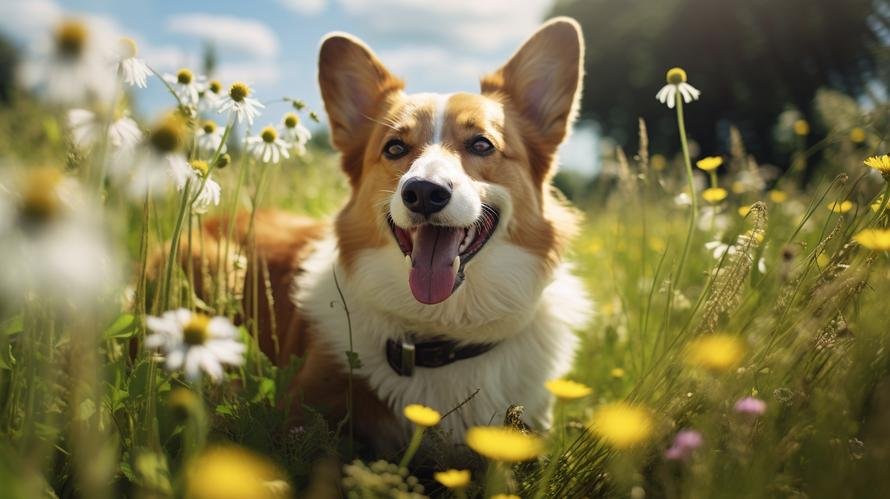Corgis, with their adorable short legs and distinctive ears, are most recognized as the Queen of England’s favorite breed. They are also known as Cardigan Welsh Corgis, named after Cardigan, a county in Wales that they originate from. Now, isn’t it fair to say that these delightful little creatures are crowned for a good reason? Well, yes, and it’s not just because of their undeniable charm and cute exteriors!
You might be asking whether a Cardigan Welsh Corgi is as easy to have around as they look. After all, they’re so tiny, what could possibly go wrong? But the main idea here is to understand that every breed has its own set of challenges. Corgis are no different, irrespective of their small stature and adorable looks.
Renowned for being herding breeds, these little powerhouses were originally bred to herd cattle in Wales. They may look small and cute but don’t be fooled. They are tough, intelligent, and independent thinkers filled to the brim with energy. So, if you’re imagining that these little charmers will simply sit around looking cute all day, you might find yourself in for a surprise. But it’s not that much of a problem – once you get the hang of the dynamism underlying their charm, you’ll see that life can indeed, be better with a Corgi by your side.
While a Cardigan Welsh Corgi might not exactly fall into the ‘difficult’ category, some challenges come with every breed, and Corgis are no exception. Knowing what these challenges are and understanding how to manage them can make life smoother and more enjoyable for you and your four-legged buddy. Keep in mind that being ‘difficult’ is not a flaw. It simply means a more in-depth understanding and commitment can make your adorable friend’s companionship even more worthwhile.
Firstly, let’s talk about the herding instincts that these dogs have inherited from their ancestors. While this may seem adorable on a farm, it might turn into a nightmare in your house – especially if there are small children, other pets, or even guests involved. Observing a Corgi trying to ‘herd’ your kids into a group can be amusing, but with their nippy nature, it can also end up bothering or scaring them.
So, how do we manage this? The answer lies in training. Proper training, coupled with socialization, could help these adorable fur balls control their herding instincts. It’s useful to remember that Corgis are intelligent dogs with an eagerness to please their owners, which can often make training a somewhat easier task.
Another point that might pose a bit of a problem is their bark – or more precisely, the frequent use of it. Now, we’ve got to understand that Corgis were bred as herding dogs. And part of being a herding dog is to be protective about the herd, which in case of a household, refers to the family. So a doorbell, the sound of someone coming up the stairs, the sight of a stranger – all these could rapidly convert your little charmer into a furious barking protector.
As with most habits, the solution, again, lies in training. In the case of barking, good practices like not reinforcing the barking behavior, removing potential triggers, and teaching quiet commands can significantly reduce the frequency and intensity of barking.
Next, we’ve got to remember that these dogs are pretty active, thanks to their herding past. A bored Corgi is an unhappy Corgi, and an unhappy Corgi could mean chewed-up shoes or dug-up gardens. Exercise and mental stimulation are crucial in keeping these little bundles of energy happy. Regular walks, playtime, and interactive dog toys are some ways to keep them entertained and active.
Finally, the breed is prone to weight gain – sometimes due to genetics and sometimes due to their love for food. Regular exercise and controlled diet can help to keep their weight in check and keep them healthy.
So there you have it: a Cardigan Welsh Corgi could be a challenge if you’re unprepared. However, with a little patience and training, these challenges can be overcome easily. After all, every dog owner knows that the rewards you get from a happy and healthy dog far outweigh any challenges you might face along the way!
The takeaway here is that dogs, just like humans, have their unique behaviors and quirks. But with understanding, commitment, and doing the best for your dog, the difficult becomes easy, the quirky becomes endearing and your home becomes a place of shared love and companionship. Happy pet parenting!
Just remember, size does not necessarily define difficulty. So, whether you’re bringing home a lively, feisty Corgi or a giant, towering Great Dane, here’s a toast to an amazing, laughter-filled, and extraordinary life together!



